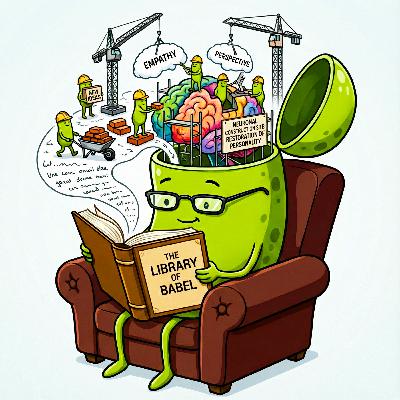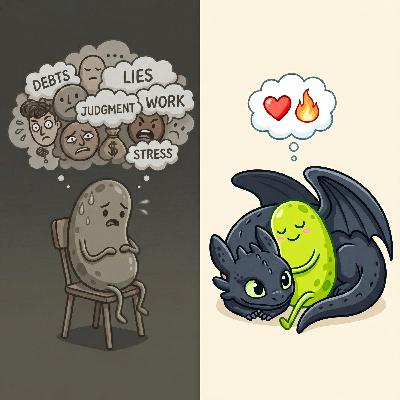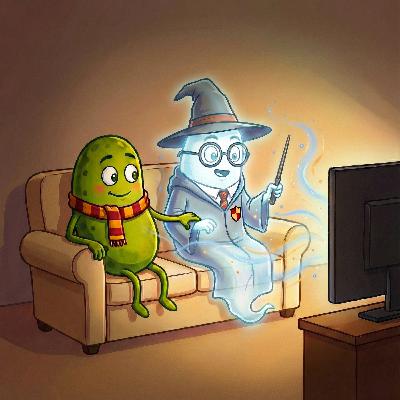Discover Learning English with Human Beans
Learning English with Human Beans

Learning English with Human Beans
Author: Georges
Subscribed: 39Played: 331Subscribe
Share
© Georges
Description
Welcome to "Learning English with Human Beans," where language learning meets social sciences! Dive into fascinating human behavior topics while naturally improving your English skills. We explore current research from psychology, sociology, anthropology... unpacking key vocabulary and expressions along the way. Each episode combines engaging social science concepts with practical language learning, helping you communicate with confidence about complex human topics. Grow your English skills through the lens of what makes us human!
68 Episodes
Reverse
Mikasa Ackerman is Attack on Titan's most lethal warrior—rated 10/10 in combat, capable of decimating titans and humans alike with surgical precision. Yet beneath her unmatched strength lies a devastating psychological fragility. In this deep-dive analysis, we explore Mikasa through the lens of clinical psychology, examining how Dependent Personality Disorder (DPD) shapes every aspect of her character.From her founding childhood trauma to her final, impossible choice, we dissect the mechanisms of trauma bonding, separation anxiety, and codependency that define her relationship with Eren. We examine how Isayama brilliantly channeled pathological attachment into superhuman violence, creating fiction's most compelling paradox: a warrior who can survive anything except being alone.But Mikasa's story goes deeper. Through her structural parallel with Ymir Fritz, we discover how one woman's liberation from toxic love became the metaphysical key to breaking a 2000-year cycle of enslavement. We explore what the series teaches us about the difference between love and dependence, freedom and attachment, and what it truly costs to choose ethics over comfort.Major spoilers for the entire Attack on Titan series.
Have you ever felt a shiver run down your spine while listening to a violin tune, or a knot in your stomach when faced with a melancholic melody? Why can simple vibrations in the air, pure physics, trigger such deep and visceral emotions?In this fascinating episode of “Learning English with Human Beans,” Alice and Marc explore one of the greatest mysteries of the human experience: the emotional power of music. Beyond the notes, we delve into neuroscience to understand how sounds “hijack” our brains and bodies.On the agenda for this sonic journey:The science of thrills: What happens in our brains when we get “goosebumps”?The paradox of sadness: Why do we actively seek out sad music when we flee from sadness in real life?Mirror neurons and empathy: How music allows us to “feel” the emotion of an instrument as if it were a human voice.Body mapping: Why do we feel music physically in our chest or throat?
"Suit up!" Everyone knows Barney Stinson—the legendary, high-fiving, magic-trick-performing playboy of How I Met Your Mother. But what if the suit isn't an armor of confidence? What if it’s actually a cage?In this episode, Alice and Marc move past the sitcom laughs to perform a deep-dive psychological autopsy on the "Legendary" Barney Stinson. Using his character as a lens, we deconstruct the mechanics of Narcissistic Personality Disorder (NPD). This isn't about selfies or vanity; it's about the survival of a fragmented self.
Have you ever worked yourself to the bone to achieve a goal, only to feel completely empty when you finally reached it?In this deep dive into Jack London’s masterpiece (with SPOILERS), Martin Eden, Alice and Marc explore the dark side of the "American Dream." We analyze the tragic journey of a rough, uneducated sailor who transforms himself into a literary genius—not for art, but to be worthy of a bourgeois woman named Ruth.But this is not a simple love story. Using René Girard’s theory of Mimetic Desire, we deconstruct why Martin’s rise to glory leads directly to his end.In this episode, we discuss:Do we really desire things, or do we just imitate the desires of others?Why realizing that your "role models" are mediocre can be fatal. How Martin Eden exposes the "hall of mirrors" of high society.Join us for a terrifying autopsy of the human ego, and find out why the only thing more dangerous than failing is getting exactly what you thought you wanted.
We diagnosed the illness (Episode 64) and we saw the terrifying prognosis for democracy (Episode 65). Now, it is time for the cure.In this explosive finale of our trilogy based on Reader, Come Home, Alice and Marc refuse the path of the Luddite. We cannot throw away our screens, but we can stop them from rewiring our children.In this episode, we build the "Reader of the Future":The Critical Window (0-5 Years): Why the "Digital Nanny" is a disaster for a toddler's developing brain and why "Lap Reading" creates the physical foundation of attention.The Art of Code-Switching: How to train a Hybrid Mind capable of using the screen for speed and the page for depth—and knowing exactly when to switch gears.Reader, Come Home: A final call to action to reclaim your "Fortress of Solitude" in a world of noise.
In the previous episode, we discovered that we have lost our “cognitive patience.” But is it really that bad if we can no longer read complex novels?In this intense second installment of our trilogy based on Maryanne Wolf's Reader, Come Home, Alice and Marc answer with a resounding “YES.” We dive into the heart of the Deep Brain to understand what we really lose when we “skim” a text.On the agenda:The Engine Room: Discover what happens in your brain during the precious milliseconds of delay that digital technology eliminates. This is where insight is born.The End of Empathy: Why deep reading is the only way to practice “Passing Over” (inhabiting the consciousness of another) and why screens turn us into judges rather than observers.A Threat to Democracy: The direct and disturbing link between the atrophy of our attention and the rise of fake news and demagoguery.
Have you ever opened a book you used to love, only to find that you can no longer focus on the page? Do you feel an urgent, twitchy need to check your phone after just two paragraphs of "dense" text?In this first installment of our special trilogy based on Maryanne Wolf’s Reader, Come Home, Alice and Marc explore the fragile miracle of the Reading Brain. We discuss why humans were never actually "born" to read and how our brains had to perform a feat of "Neuronal Recycling" to create a circuit for literacy.Discover how the digital age is physically dismantling this circuit. We break down the "F-Pattern" of screen reading, the "Bleed Over" effect that ruins our concentration on paper, and the loss of Cognitive Patience. We also share the haunting story of how the world's leading expert on reading failed her own test against a classic novel.
What if the end of the world wasn't a hell of dust and violence, but a paradise of comfort and harmony?In this episode, Alice and Marc dissect the narrative universe of the Pluribus series. Forget brutal invasions like Star Trek; here, humanity is not undergoing a war, but an “update.” We explore how this collective consciousness (the Hive Mind) uses abundance and empathy as weapons of mass destruction of identity.
Are "monsters" made, or are they born?In this chilling episode, Alice and Marc venture into the dark side of the brain to explore the biological roots of violence. We debunk the myth of pure evil by looking at the Biopsychosocial Etiology of Antisocial Personality Disorder.Discover why a low resting heart rate might be a predictor of criminality (the Stimulation Seeking Theory) and how the "Warrior Gene" (MAOA) can turn a child into a ticking time bomb—but only if the environment pulls the trigger.From the lead paint on your nursery walls to the "broken brakes" of the prefrontal cortex, learn why the line between a criminal and a victim of biology is thinner than you think.
Why does a polite conversation about the weather sometimes feel like a physical assault on your energy? Why do you feel like a wilting plant when stuck at a dinner party with no "real" topics?In this episode, Alice and Marc reveal that your impatience isn't arrogance—it's a biological hunger. We explore Cognitive Intolerance to Under-stimulation and why a High Need for Cognition turns boredom into a state of Agitated Stress (cortisol spike), literally starving your brain of dopamine.From the "Surface Acting" that drains your battery to the Japanese concept of Shoshin (Beginner's Mind), learn how to stop fleeing social droughts and start "gardening" conversation.
Have you ever spent three hours comparing toasters at midnight, paralyzed by the fear of making the "wrong" choice?In this episode, Alice and Marc diagnose the curse of bright minds: Pathological Optimization. Discover why having a High Need for Cognition (loving to think) paired with a Maximizer mindset (wanting the best) turns every mundane decision into a neurological ordeal.We explain how your own intelligence can backfire, causing Analysis Paralysis and Ego Depletion, and we provide the tools to break the cycle: from Dereification techniques to the mathematical proof that being a "Satisficer"—settling for "good enough"—is actually the most rational choice you can make.
Is "Brutalism" just about ugly grey buildings, or is it a philosophy of truth?In this episode, Alice and Marc decode Brady Corbet’s monumental film, The Brutalist. Follow the journey of László Tóth (Adrien Brody), a Holocaust survivor trying to rebuild his life in a predatory post-war America.Discover why concrete becomes an armor against trauma and how the clash between the architect and his billionaire patron (Guy Pearce) exposes the dark side of the American Dream. We analyze the controversial violence, the "haptic" nature of the 70mm cinematography, and the ultimate question the film poses:Can art save the artist, or is it just a commodity to be consumed by capital?
You've got everything planned: the hotel, the champagne, the mood... but when the moment arrives, your body displays an “Error 404: Desire not found” message?In this episode, Alice and Marc tackle the complex mechanics of sexual desire. Discover the Dual Control Model: why your brain sometimes hits the brakes when you want to accelerate.From the anatomical truth about the CUV Complex (goodbye to the myth of the vaginal orgasm!) to Non-Concordance (why lubrication is not proof of desire), we deconstruct common misconceptions. Learn to accept Reactive Desire, to “close the stress loop” according to Emily Nagoski, and to silence your inner critic (Spectatoring) to rediscover the path to pleasure.
What if the "Real You" didn't actually exist? In this grand finale of our trilogy "The Self is a Fiction," Alice and Marc tackle a dizzying question: is your identity merely a narrative construction constantly manufactured by your brain? From the gentle madness of Don Quixote to the trap of "Bovarism," discover how our minds superimpose stories onto the real world. But don't worry, this isn't bad news. By exploring the concept of the "Conscious Don Quixote," learn how to pick up the pen and become the co-author of your own life—without losing touch with reality.
If reading can change us for 20 minutes, can it transform us forever?In this episode, Alice and Marc move from simulation to therapy. Discover the science of Bibliotherapy and why the NHS prescribes novels instead of pills.We dive into the Proteus Effect: how adopting a mental avatar can physically alter your confidence. Learn why your "Self" is actually a Narrative Identity and how to use the Behavioral Bridge protocol to hardwire your favorite character's traits into your own brain.You aren't a statue; you are a story in progress.
Have you ever wanted to run a marathon right after finishing a novel... even though you hate sports?In this first installment of the “The Self is a Fiction” saga, Alice and Marc explore the fascinating phenomenon of Experience Taking. Discover why immersive reading is not mere observation, but a true dissolution of identity.Unlike simple “Perspective Taking” (conscious empathy), learn how your brain temporarily “turns off” your own personality to viscerally simulate that of the protagonist. From influencing your voting choices to unconsciously reducing prejudice, discover why stepping into a character's shoes changes your biological reality.Reading isn't just escapism. It's becoming.
Why do some people feel more "at home" in Middle-earth or aboard a starship than in their own neighborhood? Why is a dragon’s fire sometimes less frightening than a simple social conversation?In this final installment of our trilogy, Alice and Marc explore the vital role of fiction for neurodivergent minds (Autism, ADHD). Discover how stories act as a "social manual" with explicit rules, and why the predictability of a favorite movie watched for the 100th time is a crucial tool for emotional regulation.We’ll debunk the myth of the "lack of empathy" by looking at hyper-empathy and the Double Empathy Problem. From the honesty of robots to the safety of fantasy worlds, learn how fiction isn't an escape from reality, but a bridge that makes a chaotic world finally readable.
Why does the finale of Friends feel like a real-life breakup? Why do we feel a deep void when characters who don't know we exist disappear from our screens?In this episode, Alice and Marc decode the mechanics of Parasocial Relationships. Far from the cliché of the lonely geek, discover why your brain is evolutionarily wired to bond with fictional people through concepts like Social Snacking and the Benjamin Franklin Effect.From the "Gym of Empathy" theory to the Pratfall Effect (why we love clumsy heroes), learn how fiction acts as a safe "social simulator" that can actually upgrade your real-world emotional intelligence.
You know it’s just a movie. You know the characters are just pixels. So why are you sobbing on your couch like you’ve lost a best friend?In this episode, Alice and Marc decode the Paradox of Fiction. Discover why your "Rational Brain" (Belief) knows it's fake, while your "Primal Brain" (Alief) reacts as if it were life-or-death.From the "Low Road" of the amygdala to the theory of Make-Believe, learn how storytellers hack your biology to trigger Quasi-Emotions and why crying over a fictional death isn't a weakness—it's the ultimate workout for your empathy.
Is the "Three-Act Structure" universal, or just a Western obsession?For the grand finale of the trilogy, we travel East to explore the Kishōtenketsu—the narrative structure that powers everything from Totoro to Parasite.While the Western brain demands Conflict and linear causality (the "Chekhov’s Gun"), the Eastern brain embraces Contrast and harmony. Marc and Alice decode why Westerners often find Asian movies "confusing" or "without an ending," and how learning to accept a story without a villain can actually rewire your brain’s predictive software.























You are the best
اون آه اولش که کشیدی خیلی برای من قابل احترامه
How can I have access to the transcript?